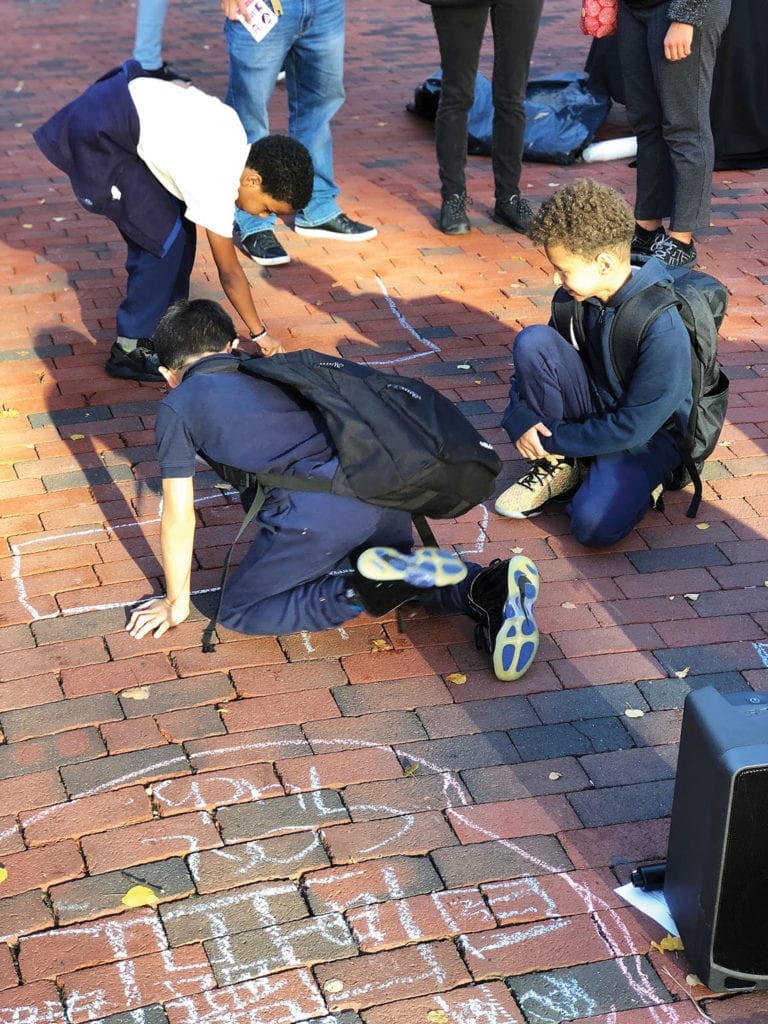Protestors ask for more PILOT cash
BPS students urge Northeastern to meet contribution requests

Boston public school students, parents and staff demonstrated at Northeastern University’s campus on Friday afternoon to persuade one of the city’s wealthiest institutions to make higher, voluntary property tax payments.
More than 100 elementary, middle and high school students chalked sketches of their “dream schools” on the walkways of Krentzman Quadrangle and penned letters to Northeastern University’s president, Joseph E. Aoun, on Huntington Avenue last Friday at 4 p.m. Organized by St. Stephen’s Youth Programs, advocates from the Boston Education Justice Alliance, the Housing Justice Coalition and the PILOT Action Group, along with Northeastern students, gathered to pressure the university to meet contribution requests made by the city under the Payment in Lieu of Taxes (PILOT) program.
“We’re hoping that Northeastern will decide to be a leader in the city and to step up and pay their PILOT taxes, which they have not been paying in the past, and fund the schools that our students go to,” said Ariel Branz, an organizer with St. Stephen’s Youth Programs, which facilitates after-school activities and college preparation classes.
One such school is Blackstone Elementary School in the South End, where Alexandra Olivero, who was out protesting last week, works two hours a day as a parent-mentor thanks to funding from St. Stephen’s Youth Programs. Olivero believes that if Northeastern met its PILOT payment goal, which totals 25 percent of the value of the university’s real estate, Boston’s public schools could independently afford more classroom assistants like her, without needing additional financial support.
“We’re talking about the relationship of Northeastern to the city and to young people,” said Ruby Reyes. “We’re thinking about the role the university plays in neighborhoods like Roxbury and what they can do for Boston residents.”
Despite an endowment of almost $800 million, Northeastern, like all of the city’s nonprofits, is exempt from paying property taxes. The PILOT program asks that educational, medical and cultural nonprofits make voluntary payments in direct funds or through in-kind contributions that benefit the community, such as building playgrounds or covering the cost of after-school programs. To date, $77 million of requested PILOT contributions have not been paid, and Northeastern has met only 29 percent of its target, despite closing out the 2017 fiscal year with a surplus of over $66 million.
“They committed to it in 2012 and they haven’t met that commitment since. They are one of the universities that has paid the least,” said Reyes. According to advocates, the other worst offenders when it comes to PILOT payments include Boston College, Harvard University and Boston University.
In a written statement to the Banner, Renata Nyul, Northeastern’s vice president of communications, said, “It is important to remember that PILOT contributions are voluntary, and Northeastern’s engagement with the city goes far beyond those payments. Through both financial and in-kind support of services and community-based programs, the university’s contributions to Boston total more than $27 million annually, including $13.5 million in scholarships to support local youth, and a more than $100 million investment to transform and maintain a city-owned playground.”
Advocates acknowledge that Northeastern has helped fund significant improvements for the community. “While we do recognize that they do contribute, we’re asking them contribute more,” said Reyes. “They’re taking vastly from the city and we’re just asking for more of a balance.”
Nyul was keen to point out that there are limits to Northeastern’s reliance on city services. The university maintains its own police force, collects and disposes of trash, and handles snow removal on campus and in surrounding neighborhoods, she said. “We are proud of our great partnership with Mayor Walsh around our shared goals for Boston and we look forward to our continued collaboration,” Nyul added.
This year Northeastern completed construction of a $225 million Interdisciplinary Science and Engineering Complex on Columbus Avenue, moving further and more visibly into surrounding neighborhoods like Roxbury and Mission Hill. As they continue to do so, relationships between the university and its neighbors are becoming increasingly tense.
“They take up half of our space,” said 18-year old Ekran Sharif, an Edward M. Kennedy Academy for Health Careers senior, who suffers from chronic migraines but only has access to a school nurse from 7 a.m. until 9 a.m. each day. “I don’t think it’s that hard to ask a university that has everything they want to pay back something to Boston Public Schools.”
As children scribbled pictures of their perfect school on the sidewalks, many like Sharif spoke of the resources that they go without, and advocates made the case for larger PILOT payments.
“We believe that every student should have a cafeteria, should have a full-time nurse in their school, should have a librarian, have enough academic, social and emotional support, have technology and enrichment activities so that they can grow up and attend schools like Northeastern,” said Branz.






